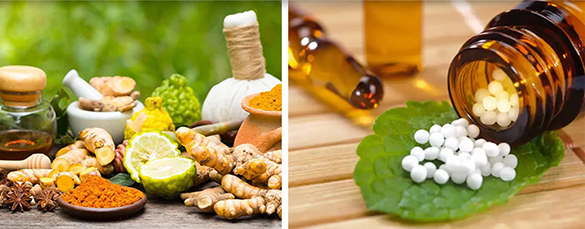
Homeopathic and Ayurvedic Treatments for Lupus (SLE)
Systemic Lupus Erythematosus (SLE) is a chronic autoimmune disorder that can affect various organs and tissues, including the skin, joints, kidneys, and brain. It is characterized by periods of inflammation and damage, often leading to symptoms such as fatigue, joint pain, skin rashes, and organ dysfunction. While conventional medicine focuses on managing symptoms and preventing flare-ups, Homeopathy and Ayurveda offer complementary approaches aimed at balancing the immune system and supporting overall health.
Homeopathic Treatment
Homeopathy treats Lupus by addressing the patient’s overall constitution, symptoms, and emotional state. Commonly used remedies include:
- Arsenicum Album: Beneficial for patients with fatigue, anxiety, and burning pains, particularly those with skin eruptions and ulcers.
- Calcarea Carbonica: Suitable for individuals who experience joint pain, weakness, and a tendency to catch cold easily, often with swollen lymph nodes.
- Natrum Muriaticum: Used for patients with skin rashes, particularly in areas exposed to sunlight, along with emotional stress and sensitivity.
- Sepia: Effective for women with hormonal imbalances, chronic fatigue, and a tendency toward depression, especially with skin pigmentation changes.
- Sulphur: Recommended for patients with itchy, burning skin eruptions, particularly those that worsen with heat and bathing.
Homeopathic treatment is highly individualized, and it is essential to consult with a qualified homeopath to determine the most appropriate remedy for each patient.
Ayurvedic Treatment
In Ayurveda, Lupus is viewed as an imbalance in the immune system, often involving disturbances in the Pitta and Vata doshas. Ayurvedic treatments focus on balancing the doshas, reducing inflammation, and supporting the immune system. Key Ayurvedic treatments include:
- Ashwagandha (Withania Somnifera): An adaptogenic herb that helps reduce stress, support immune function, and improve energy levels.
- Turmeric (Curcuma Longa): Known for its potent anti-inflammatory and antioxidant properties, turmeric helps reduce inflammation and support overall health.
- Guduchi (Tinospora Cordifolia): A powerful immune-modulating herb that helps detoxify the body, reduce inflammation, and enhance resilience against infections.
- Amla (Indian Gooseberry): A rich source of vitamin C and antioxidants, Amla helps balance the immune system, reduce inflammation, and protect tissues from damage.
- Brahmi (Bacopa Monnieri): Known for its calming effects on the nervous system, Brahmi helps reduce stress and support mental clarity.
Panchakarma Therapy
Panchakarma, the Ayurvedic detoxification and rejuvenation therapy, can be beneficial in managing Lupus. Treatments like Abhyanga (therapeutic oil massage), Basti (medicated enemas), and Shirodhara (medicated oil therapy on the forehead) help balance the doshas, reduce stress, and promote overall well-being.
Lifestyle and Dietary Recommendations
- Diet: A Pitta-pacifying diet that includes cooling, nourishing foods like fresh fruits, vegetables, whole grains, and healthy fats. Avoid spicy, fried, and processed foods, as well as excessive sun exposure.
- Yoga and Meditation: Gentle yoga practices and pranayama (breathing exercises) can help reduce stress, improve flexibility, and support immune health.
- Daily Routine: Establish a regular daily routine that includes consistent sleep patterns, regular meals, and relaxation techniques to help manage symptoms and enhance overall quality of life.
Conclusion
Lupus (SLE) is a complex and challenging condition that requires a holistic approach to care. Integrating Homeopathic and Ayurvedic treatments can provide significant relief from symptoms, support the immune system, and improve overall quality of life. It is important to consult with qualified practitioners in both Homeopathy and Ayurveda to develop a personalized treatment plan tailored to the patient’s specific needs.


